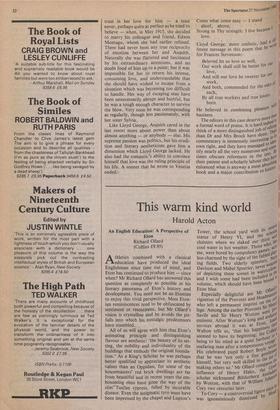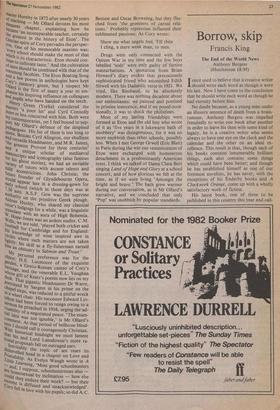This warm kind world
Harold Acton
An English Education: A Perspective of Eton Richard 011ard (Collins £9.95) Athletics combined with a classical education have produced the ideal Englishman since time out of mind, and Eton has continued to produce him — since when? Mr Richard 011ard has answered this question as completely as possible in his literary panorama of Eton's history and development. You need not be an Etonian to enjoy this vivid perspective. Most Eton- ian reminiscences tend to be obfuscated by sentiment or resentment, but Mr 011ard's vision is crystalline and he avoids the pit- falls into which his nostalgic predecessors have stumbled.
All of us will agree with him that Eton's animating principle and distinguishing flavour are aesthetic: 'the beauty of its set- ting, the nobility and individuality of the buildings that embody the original founda- tion.' As a King's Scholar he was perhaps better qualified to appreciate its aesthetic values than an Oppidan, for some of the housemasters' red brick dwellings are far from beautiful and in recent years the em- bosoming elms have gone the way of the slim' TusVan cypress, felled by incurable disease. Even the astigmatic tyro must have been impressed by the chapel and Lupton's
Tower, the school yard with its eentral.0 statue of Henry VI, and the ec11.,,,°11t1 cloisters where we slaked our thirst rokt cool water in hot weather. Those vill°',ev re me, were bored by compulsory games, '4 less charmed by the sight of the fabled ,P'"iti ing fields. Two elderly spinsters, 14.61 Davison and Mabel Spurrier, never wearliar, EvaontoldanmIbe wish some had been included A volume, which should have been boon inctatereoin-thirie of depicting these scenes in Especially delightful are Mr n tet5 ad5 vignettes of the Provosts and Heaarn-01. iwho left a permanent imprint on th.,e „ry Amanodngstihr eHeaeralrieyr Pwrootvtoosats wSierrelepo"re,its Savile e eminent. After Wotton's long and aru"..4 himself, but very well skilled in the a, the Eton, Teo services abroad it was at Walton tells us, 'that his hapPirle,..ssAtiege seemed to have its beginning; the LN,00 being to his mind as a quiet harbour seafaring man after a tempestuous voYogoie, His celebrated pupil Robert Boyle that he was 'not only a fine gel-It'll of making others so.' Mr 011ard comParele'retl: influence of Henry Hales, the ;105 scholar nicknamed Bibliotheca An: „son CbyorWy otwttoonc,eawtaitrhietshlaatteorf. J01- To Cory — a controversial figure sirgecande, was ignominiously dismissed by Master Hornby in 1872 after nearly 30 years of teaching — Mr 011ard devotes his most eloquent chapter, explaining how he became 'an incomparable teacher, certainly the greatest in the history of Eton'. The Grecian spirit of Cory pervades the perspec- tive. One of his memorable maxims was: 'every school should make the most of that Which is its characteristic. Eton should con- tinue to cultivate taste.' And the cultivation Or taste should be combined with that of the reasoning faculties. The Eton Boating Song Coa few poems in anthologies have kept memory green, but I suspect Mr 011ard is the first of many a year to em- ,Phasise his inspiring influence on colleagues and Pupils who have handed on the torch. mast Henry Green (Yorke) considered the ers 'a poor lot' and Cyril Connolly More or less concurred with him. Both were MY contemporaries, yet I feel bound to sup- q�oPPort Mr 011ard's defence of the despised ed -agogues. His list of them is too long to quote. Besides Cyril Alington, our ebullient the versatile Headmaster, and M.R. James, egreatest Provost for three centuries' and a unique scholar of mediaeval u_lanuseripts and iconography (also famous tor his ghost stories), we had an enviable variety of tutors with arcane talents and fumild eccentricities. John Christie, the ture founder of Glyndebourne Opera, d ul , appear late in a dressing-gown for ;any school
(which in those days was at .3° authoritlam). A.S.F. Gow was the supreme
on th primitive plugh. Aldous Hux, y, e Greeke who shared my classical tilte'r's lodgings for a while, was a linguistic s\t\!linulant with an aura of High Bohemia. 2. el,HoPe-Jones was an ardent nudist. C.M. ls, we are told, 'played both cricket and football for Cambridge and for England: his knowledgecircles of wine inspired awe in ,.ere such matters are not taken his skill as a fly-fisherman earned min an obituary in Salmon and Trout.' rthiNlY personal preference was for the Vrderi H.E. Luxmoore of the exquisite
a Greco-Roman cameo of Cory's
Wehritage, and the venerable E.L. Vaughan desk 'lose gift of Keats's poems now lies on my pesk. That gigantic Headmaster Dr Warre, ortrayed by Sargent in his prime on the hap l steps, was reduced to a pitiful wreck ti2,a wheel chair. His successor Edward Lyt- seetton had been forced to resign owing to a vi,iiii"Lo,n he preached in 1916, urging the ad- auIlity of a negotiated peace.essen- e: Idea was not ignoble,' is Mr 011ard's ,s'rrnent. At that period of bellicose blind- 11,es.s I should call it courageously Christian. that historical hindsight we must lament ttitiat his and Lord Lansdowne's more ra- onal Proposals fell on outraged ears. Inevitably the topic of sex rears its dishevelled head in a chapter on Love and ti,e„1-1dshiP. As Evelyn Waugh wrote in A "'e Learning, 'Most good schoolmasters and I suppose, schoolmistresses also are homosexual by inclination — how else intthey endure their work? — but their erest is diffused and unacknowledged'. Le'rY fell in love with his pupils; so did A.C.
Benson and Oscar Browning, but they flin- ched from 'the grossness of carnal rela- tions.' Probably repression inflamed their sublimated passions. As Cory wrote: Show me what angels feel. Till then I cling, a mere weak man, to men.
Drugs were only connected with the Opium War in my time and the few boys labelled 'sods' were only guilty of furtive masturbations. A quotation from Brian Howard's diary evokes that precociously sophisticated friend who astonished Edith Sitwell with his Dadaistic verse in 1921. We tried, like Rimbaud, to be absolutely modern. There was nothing decadent about our enthusiasms: we painted and poetised in pristine innocence, and if we posed occa- sionally, it was to shock the philistines.
Most of my lasting friendships were formed at Eton and the old boy who wrote of it as 'five years in a lukewarm bath of snobbery' was disingenuous, for it was no more snobbish than other schools, possibly less. When I met George Orwell (Eric Blair) in Paris during the war our reminiscences of Eton were exchanged with humourous detachment in a predominantly American mess. I think we talked of Dame Clara Butt singing Land of Hope and Glory at a school concert, and of how glorious we felt at the time, as if we were living 'Amongst the bright and brave.' The bath grew warmer during our conversation, as in Mr 011ard's narrative, and we concluded that only 'Pop' was snobbish by popular standards.











































 Previous page
Previous page